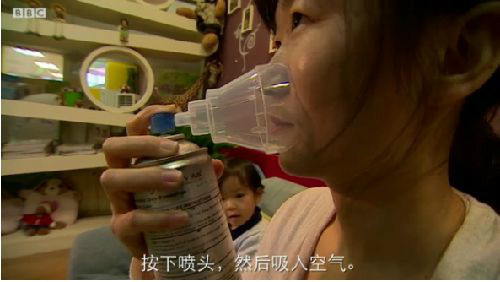 |
|
A BBC screenshot shows a woman breathing air from a can. |
BEIJING - China's smog has made masks and air purifiers the hottest of commodities. Now, a new product is getting all the attention: bottled air.
BBC screenshots of a woman breathing air from a can went viral on the Internet this week, with the broadcasting corp reporting that many Chinese residents are beginning to buy cans of fresh air from Canada.
The products come in different volumes. A bottle that contains 150 breaths costs about 120 yuan ($18.5). The air comes from the Rocky Mountains, which boasts the purest air and contains "natural energy", according to the company's official website.
On Tuesday, forty cities in north China, including Beijing and Tianjin, issued alerts for air pollution. Hebei Province and the port city of Tianjin issued their first red alerts, joining neighboring Beijing in the red zone.
Moses Lam and Troy Paquette, owners of the company that sells fresh air, Vitality Air, initially wanted to sell fresh Canadian air to Americans, but decided to bring their products to China about two months ago after hearing about the pollution.
"We did a promotion on Alibaba's Tmall on China's Singles' Day on Nov. 11," said Catherine Qi, Vitality Air's marketing director. "Because our concept is new and Beijing was blanketed in acrid smog, our product caught market attention quickly."
The air is sold mainly in the smog hot-spots of north and northeast China, as well as in some high-end clubs and international schools, she said.
The first batch, only 500 bottles - has sold out, and the company has received orders for 4,000 more, Qi added.
The story fueled a wave of heated discussion, with some calling the phenomenon "interesting".
In Beijing, where PM2.5 (particles smaller than 2.5 micrometers used to measure air quality) soared to 330 micrograms per cubic meter on Tuesday, people can understand why the commodity is in demand, but many are embarrassed by their living environment.
Some feel the product is a mere marketing gimmick, describing the products as a foreign mockery of China's environmental problems.
